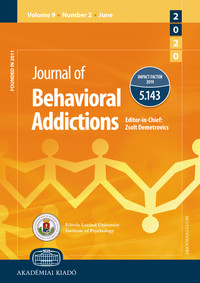Training gamblers to re-think their gambling choices: How contextual analytical thinking may be useful in promoting safer gambling
Training gamblers to re-think their gambling choices: How contextual analytical thinking may be useful in promoting safer gambling
Author(s): Tess Armstrong, Matthew J. Rockloff, Matthew Browne, Alexander BlaszczynskiSubject(s): Behaviorism
Published by: Akadémiai Kiadó
Keywords: gambling-related cognitions; erroneous beliefs; harm minimisation; analytical thinking
Summary/Abstract: Background and aims. Harmful gambling has been associated with the endorsement of fallacious cognitions that promote excessive consumption. These types of beliefs stem from intuitively derived assumptions about gambling that are fostered by fast-thinking and a lack of objective, critical thought. The current paper details an experiment designed to test whether a four-week online intervention to strengthen contextual analytical thinking in gamblers is effective in changing gamblers cognitions and encouraging safer gambling consumption. Methods. Ninety-four regular gamblers who reported experiencing gambling-related harm were randomly allocated to either an experimental (n = 46) or control condition (n = 48), including 45 males, ranging from 19 to 65 years of age (M = 36.61; SD = 9.76). Following baseline measurement of gambling beliefs and prior week gambling consumption, participants in the experimental condition were required to complete an adaption of the Gamblers Fallacy Questionnaire designed to promote analytical thinking by educating participants on common judgement errors specific to gambling once a week for four weeks. Post-intervention measures of beliefs and gambling consumption were captured in week five. Results. The experimental condition reported significantly fewer erroneous cognitions, greater endorsement of protective cognitions, and reduced time spent gambling post-intervention compared to baseline. The control group also reported a reduction in cognitions relating to predicting and controlling gambling outcomes. Conclusion. Cognitive interventions that encourage gamblers to challenge gambling beliefs by reflecting on gambling involvement and promoting critical thinking may be an effective tool for reducing the time people invest in gambling activities.
Journal: Journal of Behavioral Addictions
- Issue Year: 9/2020
- Issue No: 3
- Page Range: 766-784
- Page Count: 19
- Language: English

